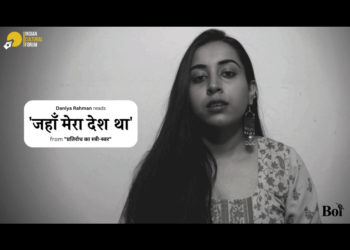Sugathakumari started to write in the 1950s and in the following decades, not only wrote poems which pushed the horizons of literary idiom in new directions, but also amalgamated deeply lyrical sensibilities with an unwavering commitment to intervention in the world around her. Echoing some of the issues raised by the women’s movement of the seventies and eighties, Sugathakumari’s poetry mounted an increasingly feminist responses to social order and injustice.
Sugathakumari was felicitated with the Sahitya Academy Award in 1978 for the collection of poems Rathri Mazha, the title of which we feature in Bol this week. Rathri Mazha, soaked in melancholy, articulates the solitary musings of a distraught heart, but not without a haunting sense of feminist concern underlying it. Filmmaker Priya Thuvassery, whose stories pose similar concerns of environment, gender and community, reads this enduring poem by Sugathakumari for Bol.
Night Rain
Translated by H. Hridayakumari
Night rain,
Like some young madwoman
Weeping, laughing, whimpering,
For nothing
Muttering without a stop,
And sitting huddled up
Tossing her long hair.
Night rain,
Pensive daughter of the dusky dark
Gliding slowly like a long wail
Into this hospital,
Extending her cold fingers
Through the window
And touching me.
Night rain,
When groans and shudders
And sharp voices
And the sudden anguished cry of a mother
Shake me, and put my hand to my ears
And sob, tossing on my sickbed
You, like a dear one
Coming through the gloom with comforting words.
Somebody said,
The diseased part can be cut and removed
But what can be done with the poor heart
More deeply diseased?
Night rain,
Witness to my love,
Who lulled me to sleep
On those auspicious nights long ago,
Giving more joy than the white moonlight
Which made me thrill with joy
And laugh.
Night rain,
Now witness to my grief
When on my sweltering sickbed
In the sleepless hours of night
Alone I reel with pain,
Forgetting even to weep
And freeze into stone.
Let me tell you,
Night rain,
I know your music, kind and sad,
Your pity and your suppressed rage,
Your coming in the night,
Your sobbing and weeping when all alone;
And when it is dawn
Your wiping your face and forcing a smile,
Your hurry and your putting on an act:
How do I know all this?
My friend, I, too, am like you
Like you, rain at night.




